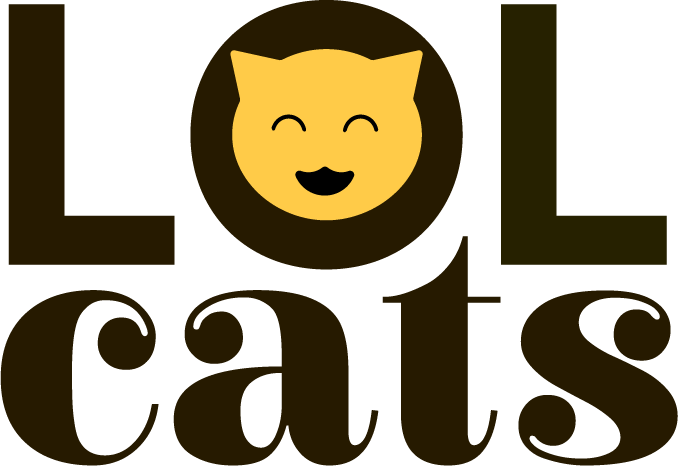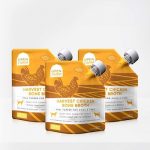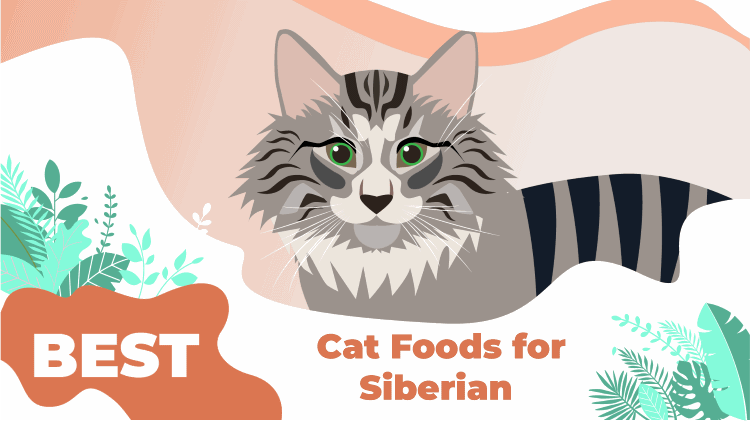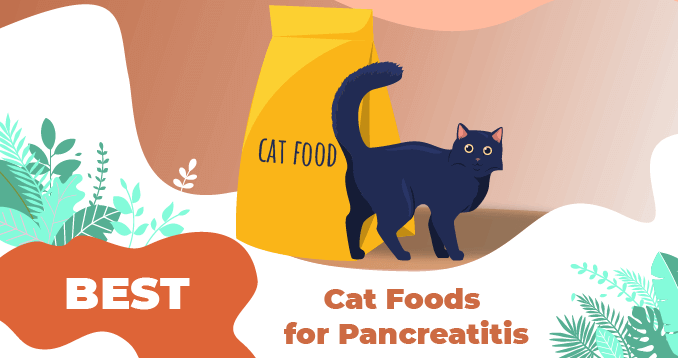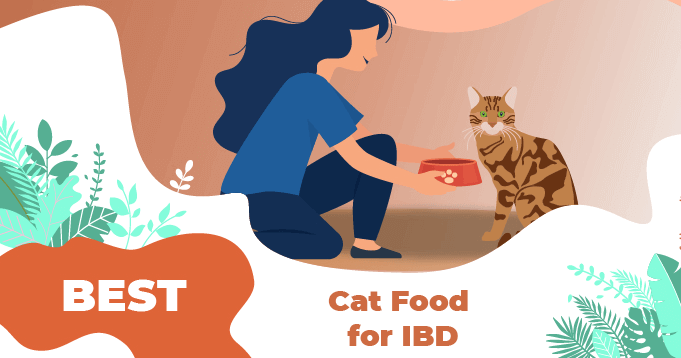6 Best Cat Food For Constipation
This page contains affiliate links. We may earn money or products from the companies mentioned in this post through our independently chosen links, which earn us a commission.
Constipation can be very troubling to your lovely cat just as it is to a human infant or even an adult. Although it is a common digestive problem in domestic animals, it should not be occurring frequently.
Constipation is usually a result of the stool being either too firm or too large, or both making it hard for your cat to expel.
Whenever you hear your cat straining in a litterbox, producing very little or no stools or the little amount they do produce is very firm and dry, you should take it to a vet because it may be suffering from constipation.
Compare Best Cat Food For Constipation
|
Best Affordable
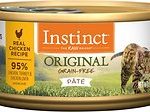
3. Instinct Original Grain-Free Pate Real Chicken Recipe Wet Canned Cat Food |
Premium Choice
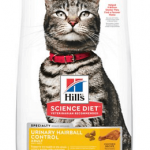
4. Hill's Science Diet Adult Urinary Hairball Control Dry Cat Food |
Most Popular
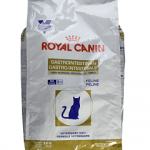
5. Royal Canin Veterinary Diet Gastrointestinal Fiber Response Dry Cat Food |
Best Dry
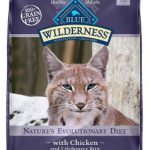
6. Blue Buffalo Wilderness Chicken Recipe Grain-Free Dry Cat Food |
||
|
Protein
2.3% Min |
Protein
21.2% Min |
Protein
10% Min |
Protein
29.5% Min |
Protein
29% Min |
Protein
40% Min |
|
Fat
0.1% Min |
Fat
8.05% Min |
Fat
7.5% Min |
Fat
16% Min |
Fat
13% Min |
Fat
18% Min |
|
Fiber
1% Max |
Fiber
0.4% Max |
Fiber
3% Max |
Fiber
6.5% Max |
Fiber
4.7% Max |
Fiber
4% Max |
|
Moisture
97% Max |
Moisture
66.1% Max |
Moisture
78% Max |
Moisture
8% Max |
Moisture
8% Max |
Moisture
9% Max |
|
Caloric Content
160 kcal ME/kg, 2.25 kcal ME/tbsp |
Caloric Content
550 kcal/package |
Caloric Content
193 kcal/5.5 oz can |
Caloric Content
327 kcal/cup |
Caloric Content
361 kcal/cup |
Caloric Content
443 kcal/cup |
|
Food Type
Fresh |
Food Type
|
Food Type
|
Food Type
|
Food Type
|
Food Type
|
Best Cat Food For Constipation Reviewed
If your cat is experiencing any of the symptoms above, it is a sign of constipation.
A diet with high moisture and fiber content is essential in halting this condition. If your cat is diabetic or has anal gland disease, then a fiber diet is usually recommended. The following cat food will help your cat if it is suffering from constipation.
Open Farm Harvest Chicken Bone Broth
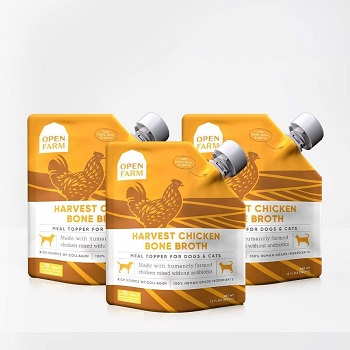
Product Info
- Protein: 2.3% Min
- Fat: 0.1% Min
- Fiber: 1% Max
- Moisture: 97% Max
- Caloric Content: 160 kcal ME/kg, 2.25 kcal ME/tbsp
- Food Type: Fresh
- Animal protein sources are the food’s primary ingredients
- Free of potentially-harmful artificial colors, flavors, and preservatives
- Cats tend to love the taste of this food
- Cost is above market average
The remainder of the ingredients are added vitamins and minerals. We would consider this food to be a limited ingredient diet and one that your cat would devour.
Open Farm Harvest Chicken Bone Broth has 2.3 percent crude protein, 0.1 percent crude fat, 1 percent crude fiber, and 97 percent moisture. So, it has lots of meat protein that cats need and love.
Smalls Fresh Minced Chicken Cat Food
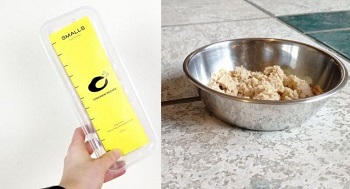
Product Info
- Protein: 21.2% Min
- Fat: 8.05% Min
- Fiber: 0.4% Max
- Moisture: 66.1% Max
- Caloric Content: 550 kcal/package
- Fresh chicken (thigh and breast) as first two ingredients
- High in moisture for digestion and hydration
- Free from grains and fillers
- Low carbohydrate content (estimated under 2%)
- Doesn’t come proportioned in daily meals
- Some cats may be sensitive to chicken ingredients
Choose from a variety of wet food formulas including minced foods and pates, made with real animal proteins like chicken, turkey, and beef. Smalls also offers a selection of freeze-dried food and treats, all of which can be delivered right to your door in convenient monthly shipments.
If you’re looking for a nutritious, highly digestible cat food made with ingredients you can feel good about, Smalls is a brand worth considering.
Instinct Original Grain-Free Pate Real Chicken Recipe Wet Canned Cat Food
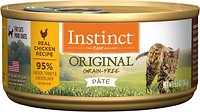
Product Info
- Protein: 10% Min
- Fat: 7.5% Min
- Fiber: 3% Max
- Moisture: 78% Max
- Caloric Content: 193 kcal/5.5 oz can
- High in protein and fat
- Made with 95 percent chicken, turkey, and liver
- This food contains no grain, potatoes, corn, wheat, soy, by-product meal, artificial colors, or preservatives
- This food is not specifically made for cats with hyperthyroidism
This recipe is made with 95 percent chicken, turkey, and liver to provide your cat with plenty of protein. It contains 5 percent vegetables, fruits, vitamins, and minerals.
This formula contains no grain, potatoes, corn, wheat, soy, by-product meal, artificial colors, or preservatives.
Hill's Science Diet Adult Urinary Hairball Control Dry Cat Food
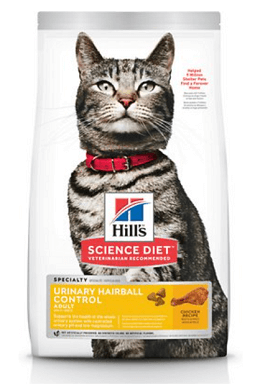
Product Info
- Protein: 29.5% Min
- Fat: 16% Min
- Fiber: 6.5% Max
- Moisture: 8% Max
- Caloric Content: 327 kcal/cup
- High protein kibble
- Contains vitamin C and E, Phosphorous and Sodium
- Great in preventing hairballs
- Suitable for cats that are 7 years and older
Royal Canin Veterinary Diet Gastrointestinal Fiber Response Dry Cat Food
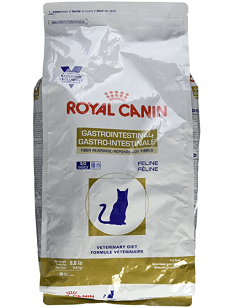
Product Info
- Protein: 29% Min
- Fat: 13% Min
- Fiber: 4.7% Max
- Moisture: 8% Max
- Caloric Content: 361 kcal/cup
- Contains adequate fiber both soluble and insoluble
- Balanced diet meal that caters to all the general needs of your cat
- Contains prebiotics, antioxidants, and Omega-3
- Precisely meant to cater for digestive issues like constipation
- Suitable for adult cats only
- It requires vet prescription
Blue Buffalo Wilderness Chicken Recipe Grain-Free Dry Cat Food
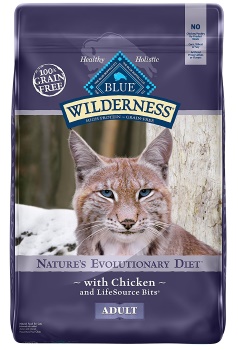
Product Info
- Protein: 40% Min
- Fat: 18% Min
- Fiber: 4% Max
- Moisture: 9% Max
- Caloric Content: 443 kcal/cup
- Beneficial supplements for balanced nutrition
- Real chicken as the number-1 ingredient
- Highly digestible recipe for maximum nutrient absorption
- Relatively expensive
If it is your first time serving this meal, start by mixing 25% of it with the previous food you were feeding your cat and continue increasing it over time for proper transition.
This cat food naturally made with fibers to eliminate those hairballs. It is made of chicken, corn, pork fat, wheat grains and cellulose that’s powdered. Mix the food with the previous meal for 7 days.
What Causes Constipation In Cats?
As a responsible cat owner, it gives you some discomfort every time your cat is undergoing this troubling situation. You should go a step further than just caring for your pet and trying to correct their situation. Constipation in cats is basically caused by the following things.
- Dehydration – Dehydration can be a result of a disease, some dietary factors like insufficient water intake, and some medications given to the cat.
- Difficulty defecating – This can be caused by some neurological problems or pain. If the cat has some fractured pelvis or hind limb then it will have some pain making it difficult to pass stool.
- GI motility problems – This may be caused by inflammation of the intestine and some medication.
- Obstruction of Colon – This is usually caused by tumor, hernia and some foreign materials like hair and inappropriate dietary routine.
- Obesity – You may not be aware that obesity increases the risk of your cat suffering from constipation. Consult you vet on an optimized diet plan to help you cat lose weight. It may include a high protein, and low fiber diet.
Signs Of A Cat Suffering From Constipation
Most of the cats show the following signs if they are having constipation:
- Loss of appetite
- Irritability
- Isolation
- Change in the mood
- Expelling little, hard and dry stool
Dietary Requirements For Constipated Cats
All cats have the same basic nutritional requirements, but cats that suffer from constipation require extra consideration.
Here are some things to look for in a good cat food for constipation:
- Quality Protein. As a carnivore, your kitten has high needs for protein and it is best when it comes from animal sources like meat, poultry, and fish.
- Healthy Fats. Fat provides your kitten with energy to fuel its growth and development as well as omega fatty acids for brain development and healthy skin and coat.
- Beneficial Supplements. Vitamin and mineral supplements ensure that your kitten gets the right blend of nutrients for healthy growth and development.
- Digestibility. In addition to making sure that your kitten’s food is full of nutritious ingredients, you need to ensure that it is digestible, so its body can absorb all of those nutrients.
Final Thoughts
It is always advisable you visit a qualified veterinarian to get an accurate assessment. This is where having a solid cat insurance health plan can come in handy.
A thorough evaluation may go as far as removing impacted stool in order to correct the disorder, conducting a physical examination, blood testing, analyzing dietary habits, spine & hind limb radiographs and carrying out urinalysis.
It can get costly, which is why you should take action as soon as you notice something.
*This article is not a substitute for veterinary advice. Your veterinarian can provide personalized suggestions relevant to your cat’s unique situation.
